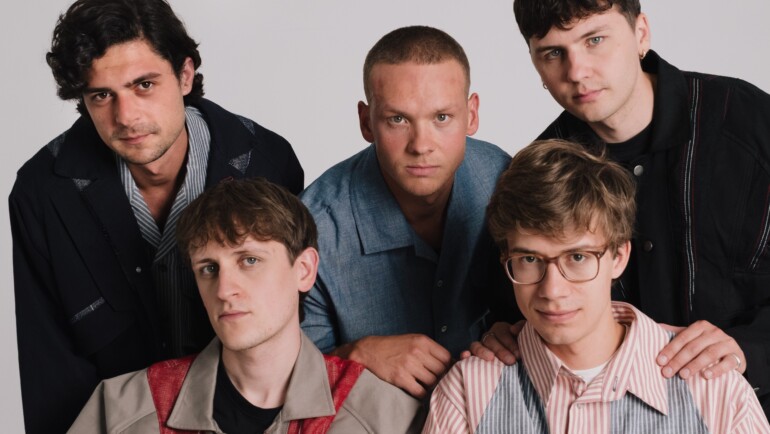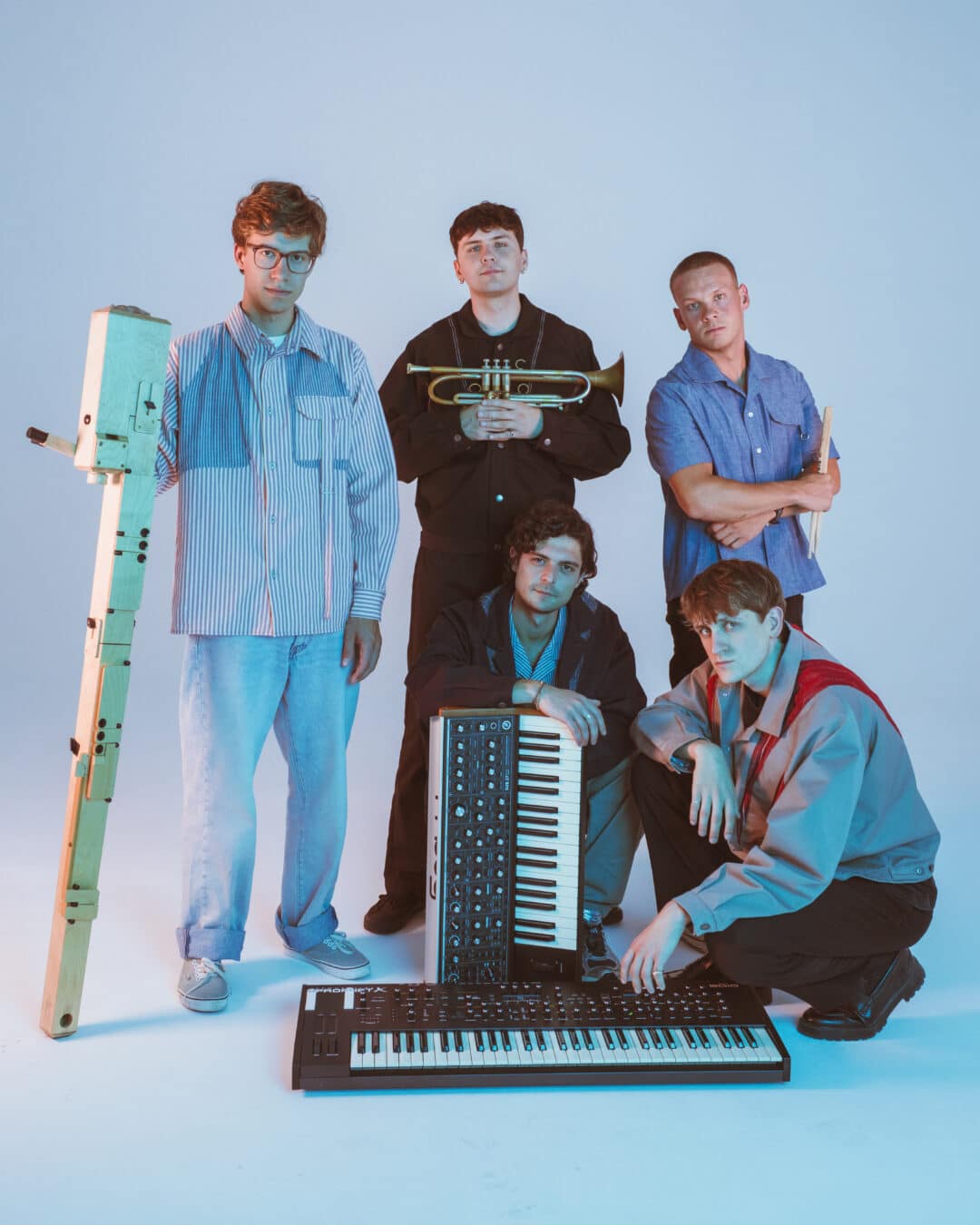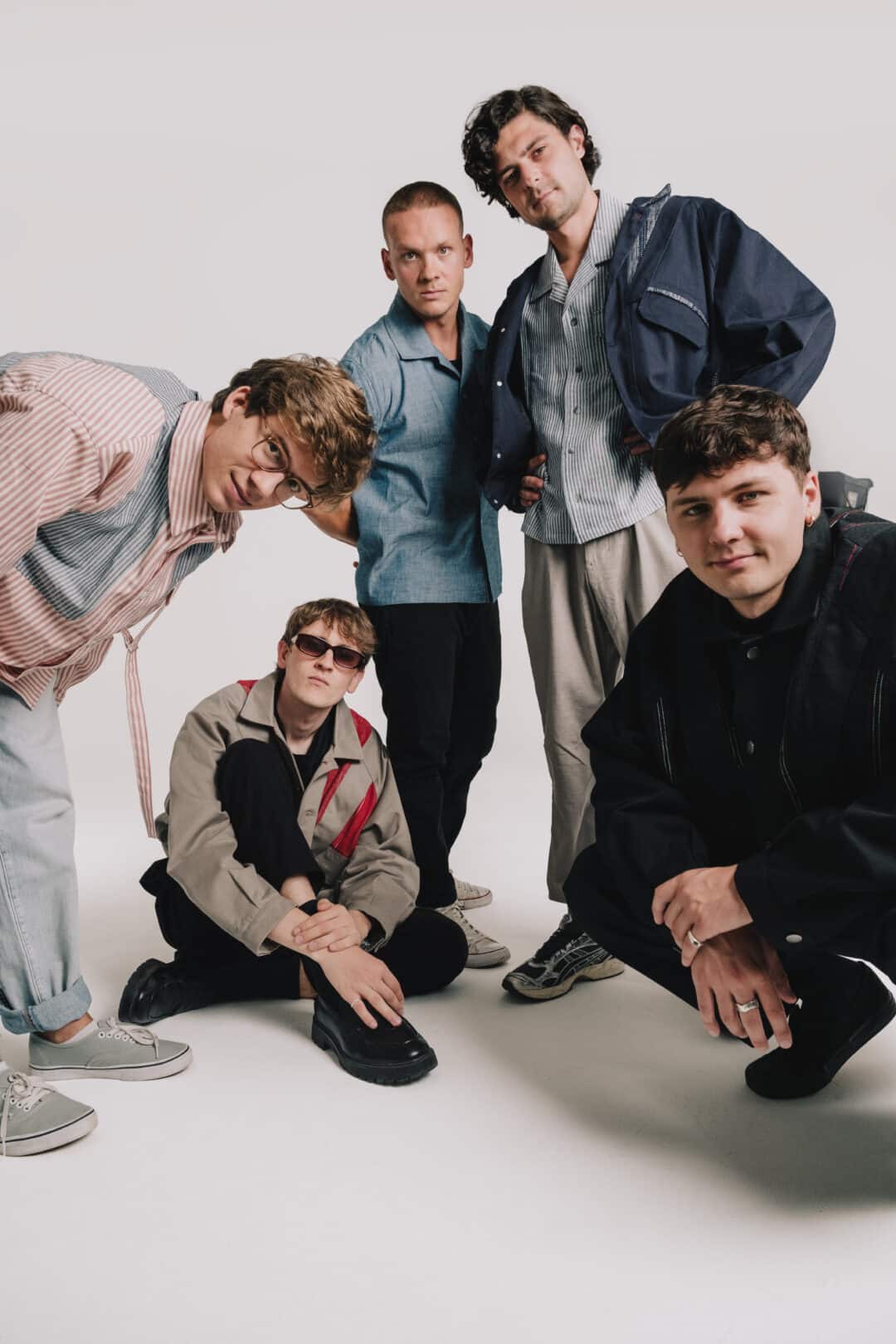
In February 2025, the debut album by LORENZ WIDAUER, FELIX GUTSCHI, FERDINAND RAUCHMANN, MAXIMILIAN REHRL, and PAUL WIDAUER—known together as the band CHEZ FRÍA— was released under the title “Die Kunst dem Fuge.” The five Salzburg natives, now spread across different cities, break open the boundaries of early music and combine it in a very idiosyncratic way with innovative sound compositions. At Café Raimann, where Falco was once a regular, drummer PAUL WIDAUER and keyboardist FERDINAND RAUCHMANN sat down with Katharina Reiffenstuhl for an interview. In it, they explain how Baroque, synths, and recorder fit together and why their album won’t be on Spotify.
Note: This interview was conducted in German in February 2025. In honor of their upcoming performance at our annual festival KICK JAZZ 2025, we have translated and re-posted the article.
How did you come together as a band?
Ferdinand Rauchmann: We all know each other from Salzburg; we went to the same school, the Musisches Gymnasium (arts-focused high school). But even before that, we’d played in different ensembles and bands. Then, at the end of 2018, we got a request asking if we wanted to play a slot at the Sanssouci Festival in Potsdam. They had a crossover slot open where you could present new ideas and concepts to a really large audience. Felix said yes back then and was like, “We’ve got something,” even if it maybe wasn’t quite as finished as he made it sound. (laughs) So we locked ourselves in a recording studio in Surheim for a week and knew we had to put on a concert.
Paul Widauer: And not sometime down the line, but three months later.
Ferdinand Rauchmann: So we had to learn a full program. The only guidelines we had were basically to combine early music with jazz, fusion, and funk. That’s what we worked on, and those were the first pieces where “Die Kunst dem Fuge” emerged—which is now the album title.
So that means you basically formed a band for this concert?
Ferdinand Rauchmann: Essentially, yes. After that we also applied for the Hubert von Goisern Prize call and then received the culture award.

So things moved very quickly.
Ferdinand Rauchmann: Yes, that same year we also performed at the Take the A-Train Festival in Salzburg. Since we had already played a lot in the Salzburg scene, it wasn’t all that hard for us.
What led to the name “Chez Fría”?
Paul Widauer: Since we were forced by circumstances to put a band together, we tried to come up with a name as quickly as possible. That usually doesn’t yield anything particularly brilliant. But there’s a bar in Salzburg called “Chez Roland.” Lorenz and Felix got stuck there late at night—or rather early in the morning—and asked themselves, “What should we call our band?” Then they realized, “Okay, we’re sitting in Chez Roland. In the fria.” Everyone always thinks it’s a super French name, but it was simply “sche fria”—Salzburg dialect for “schön in der Früh,” meaning nice and early in the morning.
Ferdinand Rauchmann: That also fits our music well: it often seems very complicated, but in fact it’s quite simple things. That’s the nice thing about music: you can interpret a lot into it, but you can also just let it wash over you.
“WHEN YOU LOOK AT THE BAND, EACH OF US HAS OUR OWN AREAS WE REALLY KNOW WELL”
The cool thing about you is that you fuse lots of different musical styles. Does each of you bring a bit of something to the table?
Paul Widauer: Definitely.
Ferdinand Rauchmann: That was kind of the basic idea behind it, too. We went to school together and sometimes made music together, but each of us was always doing different things. For Felix, our recorder player, for example, it was the Baroque style, which we always found really interesting as well. When you look at the band, everyone has their own areas they really know well.
Paul Widauer: You could just take everyone’s Spotify Wrapped and mash them together, and that’s exactly what you get. (laughs)

Ferdinand Rauchmann: Exactly—there’s simply this Baroque emphasis with early music from Felix; with Lorenz it’s about every imaginable form of jazz that’s ever existed; and Pauli always listens to funk, leaning toward groove—which is especially important in fusion. As for me, I’d say I’ve always been a real synthesizer geek. I don’t often get to work with synthesizers in other contexts; in the classical world that doesn’t really exist. That was also kind of the joke: we’re playing Bach’s The Art of Fugue, but with synthesizers that are sort of detuned and sound like the current bass sound in some nightclub.
Paul Widauer: I think that’s exciting because you’re really challenged—you have to engage with what each of the others brings. But what’s definitely important—we never lack the necessary dose of humor. That’s always there. The nonsense we talk in rehearsals, and the nonsense we play—that’s surely why things like Die Kunst dem Fuge come out of it. Because we don’t take it all that seriously and can go beyond our own horizons.
Ferdinand Rauchmann: But in the end we’re very consistent and make sure we reach a goal. If each of us—with our different backgrounds—isn’t truly convinced of an idea, the song doesn’t make it onto the record. We hone the songs for a long time and make sure that all the genres we want to represent are actually represented.
“IT DOESN’T HAVE TO BE PERFECT AS LONG AS THE VIBE IS RIGHT”
When is a composition “finished” for you?
Paul Widauer: It takes time. It’s not like in other projects where you can compose something in a day and the song is done. Here, we sometimes spend a week in the studio and nothing moves forward. But then suddenly, two months later, something happens.
Ferdinand Rauchmann: There are also old songs we’d already made and then reworked with new energy. But then there’s also the moment when our fifth member, Maxi—who runs the studio in Surheim and gives us that space—arms the microphones and says, “Let’s just record it now.”
Interviewer: You probably need that.
Ferdinand Rauchmann: You definitely need that. That way everyone focuses for a moment, and then exactly the things happen that make the songs what they are. Then everyone heads back to Vienna, Basel, or Lyon, and all we have is this demo. You listen to it over and over until the next rehearsal, until everything solidifies. We never do more than three or four takes; sometimes everything already fits on the second take—especially when the energy is right. It doesn’t have to be perfect as long as the vibe is right—and you can feel that.
You’re a purely instrumental band. And without meaning this in a judgmental way—do you never miss lyrics or vocals?
Ferdinand Rauchmann: There actually are voices on the record.
Paul Widauer: Though you need good playback to pick them out.
Ferdinand Rauchmann: If you listen closely, you really do hear voices—on two tracks, in fact. Some are synthetic, and others are actually me and Maximilian singing.
Paul Widauer: We’ve often thought about doing features—bringing someone else on board. But we’ve never seriously considered that we need a male or female vocalist.
Ferdinand Rauchmann: I think we also have a bit of a surrealist approach to music. If there were fixed lyrics, it would immediately point in one direction, and we actually don’t want that. What we have considered is throwing in Dadaist parts—voices you can’t understand. The abstract is important to us. From every corner or scene where people hear our music, everyone should be able to take their own thing from it. And even people who don’t have much to do with music should find it interesting.
Paul Widauer: Although I think that people who aren’t really into music wouldn’t listen to our music that way. For example, something you notice quickly with us is…
…you’re not an FM4 pop band.
Paul Widauer: Exactly. We’re not playing to an audience that shows up to be entertained, but rather to people who know their way around. People usually tell us that—we don’t make music that just trickles along; you have to be a bit into the material.
Ferdinand Rauchmann: I don’t quite agree. I remember Potsdam—there were people who go to that “Surprise me—what’s coming?” slot every year, who have nothing to do with music, and they were just really fascinated by the wallop they got. They’d only encountered the recorder in early childhood education. And then they come in and suddenly there’s a recorder over a rock beat, with some synth bass and really weird alien-like sounds. I think you don’t need to know anything about music to find that truly spacey.
“NOWADAYS IT’S SUPER HARD TO FIND YOUR OWN SOUND—AND I’M PROUD OF THAT WITH CHEZ FRÍA”
Your first album comes out in February. Can you say the work on it started directly with the founding of the band?
Paul Widauer: Let’s put it this way: back then for Potsdam we had a program of about an hour. Not much of that program remained. I think exactly one song made it onto the record, which is why we named the album after it: “Die Kunst dem Fuge” appears in a short version on it. Our sound has evolved massively. An album was definitely in the back of our minds when we founded the band, but sound-wise it’s something completely different now than it was then—both in terms of beat and concept. For example, we used to write everything out in notation—our entire program. Now we compose without notation. Every song is played differently each time.
Ferdinand Rauchmann: The working process was definitely there. But the moment we said “Let’s press this on vinyl” was when we’d found our sound. You can’t state that absolutely either, but it’s a bit of a feeling—and at some point we had produced and mixed so many songs—even if each song has its own story and inspiration—that this note started to shine through. Nowadays it’s super hard to find your own sound—and I’m proud of that with CHEZ FRÍA. Parts of it are so crazy and so far out. Who does that—whirls together exactly this music with these sound inspirations and instruments?
Paul Widauer: So you can already say we’ve been working on this album since the band was founded. It took steps, but we also needed those earlier songs to get to what we’re doing now.
Would you say you can hear that process on the album?
Paul Widauer: Yes, definitely. And if you know us live, you can also tell which songs are older and which aren’t.
Ferdinand Rauchmann: The proof that we developed during the process is actually that we tried to record old numbers in the new sound—and we didn’t manage it at all. We tried a lot, tinkered with things. “Die Kunst dem Fuge,” for example, was a track that always went over super well back then, and we really wanted to get it onto the album properly—but it didn’t work, it failed miserably. So we figured we’d do it completely differently. That’s where humor plays a very big role again.
Paul Widauer: Exactly. The beat that’s now on the record—we made it at 10 in the morning the day after a party with a Logic drum computer. A week before we had to send off the master file.
Ferdinand Rauchmann: That lines up again—everything super serious and sophisticated, but really it just has to feel good and be fun.
Will there be another music video? The last one was almost three years ago.
Paul Widauer: Unfortunately, we once didn’t get a grant when we were going to tackle the music video topic. We’ve always had the idea in our heads to do something totally extroverted and new, so the plan was to shoot a music video in completely untypical locations. Like…
Ferdinand Rauchmann: The Mozartkugel factory in Salzburg. (laughs) Just to name one example.
Paul Widauer: Something really quirky.
Interviewer: A nice analogy to your music.
Paul Widauer: Exactly. But that’s why we definitely want to do something visual again at some point.
Ferdinand Rauchmann: Our first priority now is to play the music as well as possible in front of an audience and thereby promote our album. Maybe there’ll be a live music video then.
“WE’RE FANS OF KEEPING IT ANALOG”
So far people can only find you on YouTube. Are you deliberately not using Spotify?
Paul Widauer: That’s deliberate. When we go public with our music, it’ll be on vinyl first. Back then it didn’t feel right anyway, because we didn’t have a finished album yet—just two tracks. Now we have the album, but we still don’t know how we want to handle streaming. We’re fans of keeping it analog. Discussions are ongoing, but for now the album will only be available on vinyl and possibly as a Bandcamp download link, where you can purchase it.
Ferdinand Rauchmann: Quality is important to us as well. It’s music you probably wouldn’t enjoy just on the side in the subway. It matters to us that you can really immerse yourself in it—and that’s also what’s nice about vinyl: there’s effort involved; you take the record off the shelf, put it on, and then you listen to the music without doing something else on the side.
Paul Widauer: The idea is also that you listen through the whole album from start to finish. There’s a build-up of tension; the songs are deliberately ordered, and there’s usually a seamless transition. When we play live, it’s performed as one continuous arc, with no songs announced one after another. That’s why it makes sense to hear it from front to back—and as we know, that’s hardly done with albums these days.
Ferdinand Rauchmann: I think if you listen through this album once, you’re on the same trip as we are.
Thank you both for the nice conversation!
Katharina Reiffenstuhl
Note: This interview was conducted in German in February 2025. In honor of their upcoming performance at our annual festival KICK JAZZ 2025, we have translated and re-posted the article.
Translated from the German original by Arianna Alfreds.
